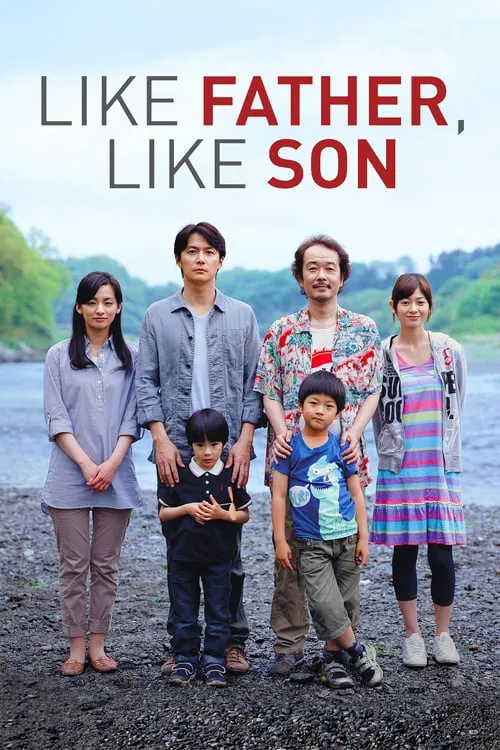Like Father, Like Son

Plot
Like Father, Like Son, a 2013 Japanese coming-of-age drama directed by Hirokazu Kore-eda, presents a poignant and thought-provoking exploration of identity, family, and the complexities of human relationships. At its core, the film revolves around the life of Ryota Nonomiya, a driven and ambitious entrepreneur played by Masaharu Fukuyama. Ryota's relentless pursuit of success has taken a toll on his personal life. Despite his affluent lifestyle, he struggles to connect with his 6-year-old son, Kyousuke, whom he raised with his wife, Midori (Rie Miyazawa). However, their seemingly idyllic life is disrupted by a shocking revelation: Kyousuke is not their biological son. This bombshell is dropped when Ryota's wife shares with him the news that they will be switching their sons with their biological counterparts, courtesy of a hospital mix-up at birth. The revelation triggers a series of emotional and introspective events as Ryota grapples with the possibility of abandoning Kyousuke, the child he has grown to love and raised as his own. Confronted with the harsh realities of this newfound knowledge, Ryota finds himself questioning his own sense of identity and the notion of what constitutes a "real" father. Meanwhile, Ryota meets his biological son, Ryota Jr., who was switched with Kyousuke at birth. This younger Ryota, played by Shohei Futaba, is shy and introverted, embodying a stark contrast to the confident and outgoing Kyousuke. As Ryota Sr. spends more time with his biological son, he begins to form a bond with him and develop a sense of paternal responsibility. However, Ryota Sr.'s love for both boys becomes increasingly complicated, forcing him to confront the moral implications of choosing between them. As a successful businessman, Ryota Sr. is accustomed to making decisions that benefit him professionally, but this situation brings him face-to-face with a more profound dilemma. His attachment to Kyousuke, which was born out of convenience and circumstance, must now be weighed against the opportunity to reconnect with his true biological son. Kyousuke, who has been deeply aware of his adopted status, struggles to come to terms with his father's conflicting emotions. He displays a quiet resilience and empathy that belies his young age, as he grapples with the possibility of losing the only father he has ever known. The film's narrative is structured around Ryota Sr.'s increasingly introspective state of mind. Through a series of poignant and often comical sequences, the audience is invited to experience the turmoil and self-doubt that Ryota struggles to conceal. Ultimately, the film's title, "Like Father, Like Son," is more than just a literal reference to the switched twins – it serves as a metaphor for the universal human desire to create and maintain meaningful relationships. Like Father, Like Son is a masterfully crafted exploration of the human condition, navigating themes that resonate with audiences worldwide. Kore-eda's nuanced direction and Fukuyama's compelling performance create a thought-provoking portrait of a man navigating the complexities of fatherhood and identity. The film ultimately arrives at a resolution that, while not neatly tied up, resonates with the film's central theme – that the choices we make, and the relationships we form, are what define us as individuals. By presenting this universal truth in a subtle yet powerful manner, Like Father, Like Son reminds us that family is not solely defined by biology, but by the bonds we build and the love we share.
Reviews
Recommendations




